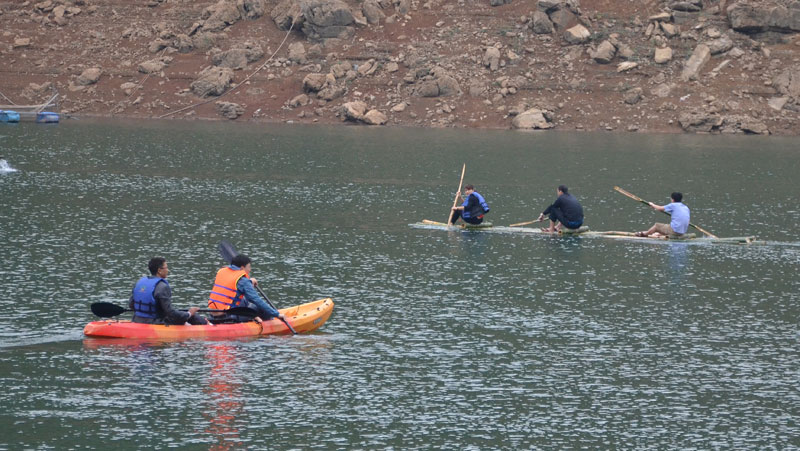
(HBO) – Community-based tourism with professional services in renowned Lac village in Mai Chau district left a strong impression on Vu Hong Quan from Ho Chi Minh City. A line-up of ancient architectural and spacious stilt houses in the village can house a throng of visitors at the same time, especially in weekends.
Homestay tourism allows
visitors to stay and experience daily activities with local families. This type
of tourism is worth a try for anyone who is interested in discovering ethnic
minority culture.
Hoa Binh is currently home to 150 households involving in community-based
tourism, 117 of them are in Mai Chau district. In addition, homestay tourism is
also developed in Muong Bi, Muong Vang, Muong Thang and Muong Dong. In recent
years, the province has paid due attention to branching out homestay tourism by
investing in infrastructure, organising tourism training and supporting vital
equipment for homestay providers.
Well-endowed with stunning natural landscapes and standout culture of the Muong,
Thai, Mong and Dao ethnic minority groups, Hoa Binh boasts huge potentials to
develop community-based tourism.
joining homestay tour, visitors truly become part of local families, immersing
in their hosts’ daily activities. They, thus, have opportunities to experience
rich cultures, cuisines and habits of local ethnic residents.
Photo: Tourists enjoy kayaking and
rafting adventures on the Da river at Da Bia hamlet, Tien Phong commune (Da Bac
district).
Coming to Da Bac mountainous district, tourists experience the life of the Muong
ethnic people along the Da river. Various intriguing activities are available
for them to join like cycling, jogging, fishing and kayaking. A simple life
style in harmony with nature and hospitable attitudes from local people has
left overriding impression on the visitors to the Da Bac community.
Vo Viet Hung from Bestway company (
Hanoi) talked
about his escape trip from crowded
Hanoito Da Bia hamlet (Tien Phong commune). "Everything is strange and marvelous. We
had interesting experiences with local residents. The accommodation is nice,
everybody in the host family is friendly and the food is delicious. We went
fishing and kayaking, took a raft adventure and danced with local people. We
will come back soon”.
Nguyen Van Ty, a homestay owner in Phu Minh commune (Ky Son district) said that
his family has welcomed many visitors, mostly foreigners, for years.
"The tourists want to discover daily life of local residents. They relax, enjoy
fresh rural atmosphere, taste traditional cuisine, go jogging and join in farming
activities,” he said.
He noted his family has paid due attention to creating a rural space by using environmentally-friendly
construction materials like wood and bamboo in an effort to preventing
concretisation in the tourism site./.
Located just a 20-minute drive from Hoa Binh City, Ora Hill Farmstay & Glamping Hoa Binh is a captivating new destination nestled in Mo hamlet, Bình Thanh commune, Cao Phong district. Combining farming with leisure, this tranquil retreat is perfect for those seeking balance, joy, and an immersive experience in the expansive beauty of nature.
Muong Bi - Tan Lac is renowned as one of the four famous Muong regions in Hoa Binh province. Blessed by nature with a favourable climate and stunning landscapes, Tan Lac holds great advantages for tourism development. The local tourism industry has made remarkable strides in recent times thanks to the attention and support from the local authorities and sectors.
With its strategic location, well-developed transport network, and diverse soil and climatic conditions, Hoa Binh is emerging as a must-visit destination in Vietnam's northwestern tourism corridor. The province boasts numerous attractions, including the Kim Boi hot springs (Kim Boi district), the Dau Rong cave complex (Cao Phong), the Mai Chau valley (Mai Chau), and the iconic Hoa Binh hydropower plant.
The northern mountainous province of Hoa Binh has been listed among the 71 most beautiful places to visit worldwide by the prestigious US travel magazine Condé Nast Traveller.
Hoa Binh province’s rich natural and cultural resources position it as a prime location for developing community-based tourism (CBT). In recent years, support from central and provincial policies, as well as assistance from non-governmental organisations, have encouraged local ethnic minority and mountainous communities to actively engage in the sector.



